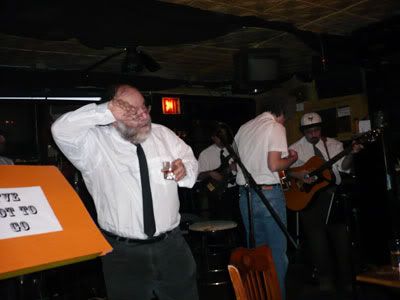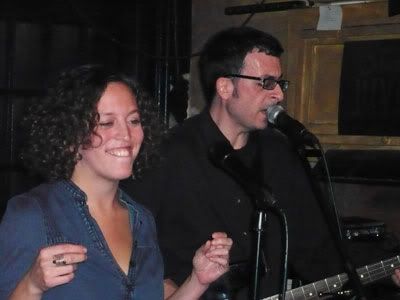Henry Purcell's 1689 Dido and Aeneas was one of the earliest English operas and is considered one of the composer's masterworks. It runs only an hour but is a true opera. Though the story, taken from Virgil's Aeneid, is a tragedy, Thursday night's performance at the Samsung Experience in the Time Warner Center was a joy, and one of an unusual sort.
The Dido Project comprises a group of singers and the Sybarite Chamber Players under the sparkling direction of Pat Diamond. They've transposed Purcell's Baroque opera about the Queen of Carthage and the hero Aeneas, with its libretto by the Irish poet and playwright Nahum Tate, to the modern boardroom. This Dido is the CEO of a major corporation, while Aeneas, rather than literally shipwrecked on the shores of Carthage, is a tycoon on the verge of economic collapse and in need of a business partner to merge with.
A bit surprisingly, the tale lends itself quite well to the updated setting. One reason is the story's resonance with the modern-day capitalist themes of independence and overwork, particularly for women. This opera is, and always has been, all about women. Indeed, its only major male role is Aeneas himself.
Another factor was the physical setting and the use of technology (I use the past tense because this was a one-time performance, though the group has plans for further events). Many modern theatrical productions use video to enhance or comment on the live action, but usually the screens or projections are fitted after the fact into a space designed mainly for live performance. The Samsung Experience at the Time Warner Center, on the other hand, is a showroom for the company's technology, particularly its screens and other video kit – a "10,000-square-foot interactive emporium of virtual reality experiences and technology."
You are surrounded by video. You walk through video to get to the performance space. You pass computers with interactive displays. Bright lighting and shiny equipment give a science-fictiony sheen to the whole environment. Everything is by Samsung, of course, including the two large screens that framed the stage displaying CNN-like "news" and commentary on the story we were witnessing. The backdrop too consisted of a large multi-panel screen, showing an image of the globe, slowly changing color like a Christmas display, reinforcing the sense that we're in a universe of nonstop worldwide news and action.
The video commentary, complete with a news crawl, was clever and funny and helped to both carry and clarify the story (I liked the novel use of the Windows "blue screen of death"). Its only disadvantage was that it replaced what in some opera performances would have been a display of supertitles. Even in an English-language opera like this one, the words can at times be hard to understand, given the strong vibrato of the female voices and the sometimes unexpected (to modern ears) phrasing of a 17th century libretto.
Still, though the audience may have missed some lines, the singers, with their top-notch voices and fine acting, made the essentials quite clear. And it is a story of essentials.
Dido loves Aeneas, but is reluctant to declare it until her sister (here an executive assistant) Belinda prods her. But three witches who hate Dido and want to ruin her life trick Aeneas into leaving town to fulfill his destiny of founding Rome (here, he is starting a new business venture without Dido). He changes his mind, but too late – Dido's heart has been irreparably broken and, more to the point, her pride fatally wounded: "To your promis'd empire fly/And let forsaken Dido die."
Blythe Gaissert conveyed Dido's sadness ("Peace and I are strangers grown") and precipitous fall with solemn, queenly magnetism. Her voice is strong, supple, almost buttery, and in the famous death scene, which was effectively video-assisted, she was moving and a little funny at the same time. Elena O'Connor as Belinda seemed slightly tentative of voice at first but quickly claimed the full measure of the role, singing beautifully while at the same time clowning divinely.
Alex Loustion was winning as the Second Woman, a more important role than its generic name makes it sound; she did a beautiful job with the lovely aria "Oft she visits this lone mountain." David Adam Moore brought a smooth, strong baritone, impeccable diction, and excellent acting skills to the relatively thankless role of Aeneas (this is a play about women, remember). Sarah Heltzel and Annie Pennies made fine witches, and Jessica Medoff-Bunchman was perfectly spectacular as the Sorceress (the head witch) – if she doesn't have a fan club, someone should start one.
The small Sybarite Chamber Players orchestra played with heart, precision, and even at certain moments a smoky intensity. Purcell's wonderful music lost nothing in the translation of the action to a setting of cutting-edge technology. Along with the musicians themselves, conducted by William Hobbs from the harpsichord, Daryl Bornstein's sound design must get some credit for this.
No more performances of Dido and Aeneas are immediately scheduled; I'm sure they'll be posted at the Dido Project's website when they are. As for the Samsung Experience, you can check it out any time you're in New York – it's right in the upscale mall at Columbus Circle known as the Time Warner Center. A visit to a bright, shiny, holiday-dressed mall in the heart of the greatest city in the world is surprisingly cheering in these tough times. The next live event in the space is an appearance by comedian Mike Birbiglia on Dec. 10 from 4-6 PM.

